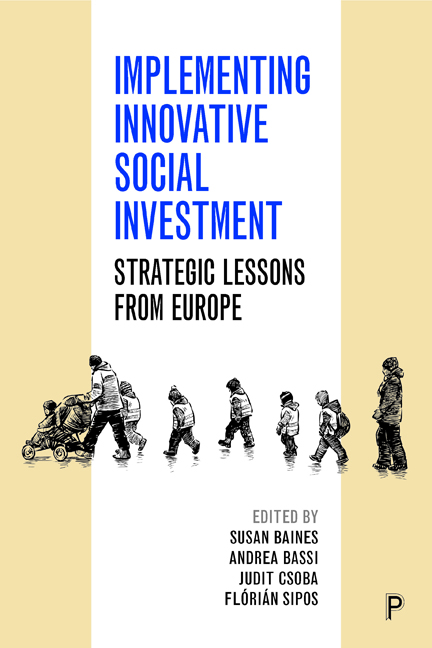Book contents
- Frontmatter
- Contents
- List of tables, figures, images and boxes
- Notes on contributors
- Acknowledgement
- one Social Investment in welfare: a sub-national perspective
- Part A Children and families: early intervention in people’s life courses
- Part B From a caring state to an investing state: labour market activation
- Part C Social solidarity and Social Investment
- Index
Part A - Children and families: early intervention in people’s life courses
Published online by Cambridge University Press: 21 April 2022
- Frontmatter
- Contents
- List of tables, figures, images and boxes
- Notes on contributors
- Acknowledgement
- one Social Investment in welfare: a sub-national perspective
- Part A Children and families: early intervention in people’s life courses
- Part B From a caring state to an investing state: labour market activation
- Part C Social solidarity and Social Investment
- Index
Summary
The three case studies included in this section illustrate examples of a core area of the Social Investment paradigm: early interventions in people's life courses and especially investing in children. A core idea of the Social Investment perspective is that the future must be assured by investing in children in order to end the intergenerational transmission of disadvantage (Jenson, 2009). Education has been called the vanguard of Social Investment (Deeming and Smyth, 2015). Hemerijck (2002) proposes a ‘developmental’ welfare agenda for 21st-century Europe. The concept of developmental welfare provides a common language for giving priority to guaranteeing high levels of employment for both men and women as a fundamental political objective, combining elements of flexibility and security, aimed at facilitating men and especially women in reconciling work and family life. The agenda implies the early identification of problems through investment in early childhood services, as well as family and child-centred interventions.
Jane Jenson (2015: 98), in a rare attempt to link Social Investment and social innovation, comments that ‘the emerging knowledge based economy requires significant investment in human capital [that] must begin with the youngest children and early childhood education’. However, there are criticisms of this as an overly instrumental conceptualisation of children that displaces both their right to a childhood and interest in their present welfare. Ruth Lister (2003) deplored the ‘emergent social investment state’ in the UK under New Labour in the early 2000s. She opposed, in particular, the implication that children should be seen as ‘citizen-workers of the future’ rather than the ‘citizen-child of the present’.
The three case studies in this book are concerned with children and families, but in very different ways. Chapter Two analyses early childhood education and care (ECEC) services, which are not only a principal policy area of the Social Investment package (European Commission, 2013), but also, according to the Europe 2020 Strategy, an essential requirement to achieve smart, sustainable and inclusive growth. ECEC services in the Emilia-Romagna region of Italy include new types of services to meet the changing needs of families. These ECEC services aim to be universal while responding to local needs. The education and care services support mothers to combine family life and employment but the overall emphasis of most participants is one of child development.
- Type
- Chapter
- Information
- Implementing Innovative Social InvestmentStrategic Lessons from Europe, pp. 23 - 26Publisher: Bristol University PressPrint publication year: 2019



